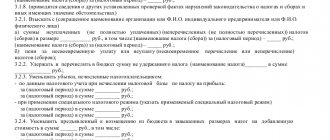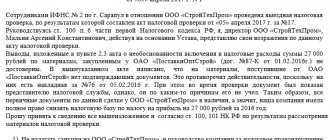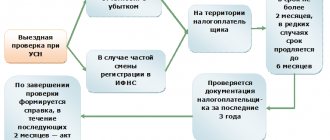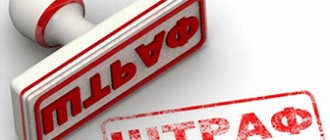In what case can the Federal Tax Service initiate the tax audit process? Let's talk a little about the foundations
The Federal Tax Service carries out regular monitoring of taxpayers. It provides for conducting desk and on-site inspections, issuing demands for the provision of information and documents, and orders for identified violations. For an organization, such events may entail the imposition of fines, additional taxes, and prosecution. Let's talk a little about this phenomenon as grounds for a tax audit.
Goal and tasks
A desk audit is always carried out in order to:
- monitor compliance with the tax code of the Russian Federation within enterprises;
- identify the amount of unpaid or underpaid tax deductions for existing violations;
- collect unpaid or underpaid debt to the tax office;
- bring violators to tax and administrative liability;
- prepare data to make a real choice of taxpayers to understand the relevance of an on-site audit;
- check the legality of applying existing benefits.
Any test has its own tasks in the field of application. A desk audit is no exception, and reports to the tax authorities:
- in checking the correctness of the formation of accounting reports;
- in calculating the amounts of tax collections transferred to the state apparatus;
- in monitoring actions over the timely provision of tax information on calculations;
- in determining discrepancies in information in financial statements;
- in checking information data indicated in accounting and tax reporting;
- in determining violations of tax liability.
Inspection of the territory during inspections
An on-site audit, as a rule, is carried out with a tax inspector visiting the territory of the taxpayer being inspected. And only if the taxpayer does not have the opportunity to provide premises for conducting an audit, an on-site tax audit can be carried out at the location of the tax authority (clause 1 of Article 89 of the Tax Code of the Russian Federation).
What the law says
A desk audit, as mentioned above, is a type of audit of the federal tax service, which is carried out with the support of the current tax code of the Russian Federation. All information concerning the procedure and rules for its implementation are prescribed in Articles 31, 87 and 88 of the Tax Code.
If you have documents that are constantly sent by various companies and enterprises, you can conduct a desk audit. Missing documentation may be requested by tax officials. The amount of this documentation is always large, so quite often situations arise when you need fully certified documentation, and not part of it.
Certified copies of documents must reflect all information data that is on the original of this paper. Tax legislation does not provide for certain conditions for providing certified copies of documents to the Federal Tax Service. It is for this reason that any documents and in any quantity can be certified.
Packages with documents must meet certain requirements:
- the text must be readable;
- when viewing packages there should be no situations with possible mechanical damage;
- it is necessary to ensure simple and unhindered copying from documents;
- all pages must be numbered, and the number of certified copies must be indicated at the end.
Folders with documents are sent to the tax authorities with an attached covering letter.
In cases where, through a desk audit, violations relating to the tax code were identified in the work of a businessman or ordinary employee, tax inspectors have the full right to impose fines, penalties, additional payments, etc. Penalties are issued if:
- the fact of tax evasion in the amount of 20% of the unpaid amounts was recorded;
- a refusal to fill out and submit tax returns and reporting documentation was established;
- other violations of an administrative nature.
If a businessman or the management team of a company hides a large amount of money from the tax inspectorate, then they will be held accountable under the articles of the Criminal Legislation of the Russian Federation.
Non-tax audits are on vacation
Nobody canceled checks from the Federal Tax Service and funds. But scheduled inspections of small businesses , which are carried out once every 3 years by Rospotrebnadzor, the Ministry of Emergency Situations, Roskomnadzor, labor inspection and other similar state control bodies, were suspended for the entire 2021 (Resolution of the Government of the Russian Federation of November 30, 2020 No. 1969). But, as always, not without exceptions.
The exemption does not apply to the most dangerous areas of activity, as well as licensed and socially significant ones, for example, healthcare and education. They will also check those who have previously grossly violated the law.
You can check whether you are subject to scheduled NON-tax audits in 2021 on the website of the Prosecutor General's Office.
Attention: with an UNScheduled NON-tax audit, auditors can visit an individual entrepreneur working in any field on the first complaint.
Dates
The Tax Code of the Russian Federation in Article 88 prescribes specific rules for conducting a desk audit. It must be implemented by the tax office no later than 90 days from the moment the taxpayer submitted a declaration and reporting documentation, which was drawn up in accordance with established standards.
Very often there are cases when this period for a desk inspection begins from the date when the documentation was received, or when the inspectors decided to conduct an inspection. But such an organization of inspection is illegal, and the court can easily find the tax inspectors guilty.
Provided that inspectors have identified violations of tax legislation within an enterprise, they are obliged to contact the judicial authorities. When filing a claim, a period of six months is given for consideration. If during this time the court has not considered the claim, then the fines determined by the tax inspectors are not applied to the defendant.
Avoid inspection or find out about it in advance - is it possible?
Taxpayers can be large or small. In relation to the latter, the state is trying to provide various relaxations, including in terms of control on its part. Thus, recently there has been a lot of talk about the need to reduce inspection activities for small businesses. And recently, a 3-year moratorium on routine inspections introduced in relation to “kids” was actively discussed. this article whether it applies to tax control
Forewarned is forearmed. This is also true in a situation with an inspection by the Federal Tax Service. If you know about the inspection in advance, you can be better prepared for it. Any taxpayer would give a lot to know if he is on the checklist. Is this possible in principle? Find the answer in this publication.
Order of conduct
Specific stages for conducting a desk audit in an organization are not established by the Tax Code of the Russian Federation. But, based on Articles 88-101, all these actions can be divided into four parts:
- The reception of documents from organizations or individuals is organized in accordance with established standards. Here, tax inspectors must double-check all the necessary information against the documents, which should be in the same folder with the declaration and calculations. Provided that all documents are in place, the verification begins.
- A decision is made to carry out desk audits within specific enterprises.
- After the inspection, reporting documentation is created, which records the progress of the inspection and its results. Inspectors have the full right to demand documents about previously declared benefits for the company (provided that they were declared in the declaration). If the declaration has a large number of errors and inconsistent data, the Federal Tax Service informs the taxpayer about this with a subsequent request to correct this information to be accurate. The taxpayer must correct the data in the declaration no later than five days later.
- A thorough analysis of the information received is carried out and a final decision is made regarding each of the audited organizations. Here, when errors and violations are identified, a specific act is drawn up. But, if there are no such violations, then tax inspectors must put a “tick” in the tax return indicating that a desk audit was carried out.
Counter check - when it’s not you who is being checked
There is no such thing as a “counter check” in the Tax Code. This is one of the types of other tax control measures. A “meeting” is carried out as part of an on-site or desk inspection of your counterparty. Or your counterparty's counterparty. That is, this is already the second link if you go along the chain of counterparties. There may be more distant links.
The bottom line is that the tax office checks the documents of the audited counterparty with yours to ensure the reality of the transaction.
Your task in the event of an oncoming meeting is to submit documents at the request of the tax authorities within the deadline specified by them. This is 5 or 10 working days, depending on the type of inspection. You should not ignore the requirement, even though they are not checking you personally. For violation of the deadline - a fine of at least 10,000 rubles. And if a fine under Article 129.1 of the Tax Code (failure to provide information) is added to liability under Article 126 of the Tax Code (failure to provide information), there will be 15,000 rubles.
A high risk of counter checks arises if an individual entrepreneur works with dubious suppliers or buyers. Therefore, at the negotiation stage, it is important to check your counterparty in order to avoid relationships with problematic ones.
Differences between desk and field inspections
At the moment, desk and on-site inspections are widely used. The latter are organized in accordance with Article 89 of the Tax Code of the Russian Federation. So what are their differences?
Desk audits are carried out in accordance with the regime of the Federal Tax Service. The audit is carried out based on information received from the company’s declarations or financial statements. It is worth saying that the taxpayer himself is not notified about the conduct of this audit, and the specific consent of the management of the tax inspectorate is not required.
The deadline for conducting a desk audit is three months, and changes that can be made according to the requirements of the tax authorities must be completed no later than five days. An inspection report is issued only if violations have been identified.
On-site inspections are not carried out for all companies, but selectively during different reporting quarters or for different tax deductions. To conduct an inspection, inspectors go directly to the organization or it is carried out at the nearest branch of the Federal Tax Service.
To begin an inspection, you must obtain permission from the manager to whom the inspectors are assigned. The management of the enterprise that will be inspected must be notified without fail. The time for conducting an on-site inspection is 2-6 months, but not more often than twice a year. At the end of the verification process, the entrepreneur or individual is issued a document stating the verification carried out. Also, inspectors must draw up a reporting act, where a decision is formed, regardless of whether there were violations or no violations.
Tax audits
Article 87 of the Tax Code stipulates two types of tax audits: desk and on-site. And after January 1, 2007, nothing has changed in this regard. But at the same time, both the substantive and procedural parts of tax audits have undergone significant changes. Let's take a closer look at the new rules for conducting inspections.
Monthly magazine “Economic and Legal Bulletin” N 1, 2007 CAMERA TAX INSPECTIONS
In the new edition of the Tax Code of the Russian Federation, the range of tasks facing a desk tax audit is significantly narrowed, as well as other parameters for its implementation. Within the meaning of paragraphs 1 and 2 of Art. 88 of the Tax Code of the Russian Federation <*> a desk tax audit is carried out at the location of the tax authority on the basis of tax returns (calculations) and documents that must be attached to the tax return (calculation) by force of law.
<*> Unless otherwise indicated, here and below are links to articles of the Tax Code of the Russian Federation in the new edition.
Moreover, as a general rule, the tax authority does not have the right to demand additional information from the taxpayer, receive explanations, as well as documents confirming the correctness of calculation and timely payment of taxes (clause 7 of Article 88 of the Tax Code of the Russian Federation). As an exception to this rule, the tax authority may request from the taxpayer documents confirming:
- the taxpayer’s right to receive tax benefits (clause 6 of Article 88 of the Tax Code of the Russian Federation);
- the right to VAT refund (clause 8 of Article 88 of the Tax Code of the Russian Federation);
- legality of application of tax deductions (Part 2, Clause 8, Article 88 of the Tax Code of the Russian Federation),
- as well as documents that are the basis for the calculation and payment of taxes related to the use of natural resources (clause 9 of article 88 of the Tax Code of the Russian Federation).
In all other cases, the tax authority’s requirement to provide additional documents during a desk audit will not comply with the Tax Code of the Russian Federation.
So, for example, if errors are detected in a tax return (calculation) and/or contradictions (inconsistencies) between the information available in the submitted documents, the tax authority will have the right to require the taxpayer to make the necessary explanations or make appropriate corrections within five days, but does not have the right request additional documents (clause 3 of article 88 of the Tax Code of the Russian Federation). Providing such documents is a right, not an obligation, of the taxpayer (clause 4 of article 88 of the Tax Code of the Russian Federation). This is precisely the path followed by judicial practice in the past. In particular, the Federal Antimonopoly Service of the Volga Region, in Resolution dated October 11, 2005 N A55-5609/05-29, explained that a desk audit consists of identifying errors made when filling out tax returns and contradictions between the information contained in the submitted documents, and should not replace constitutes an on-site inspection. If a desk check does not reveal any contradictions in the submitted documents, then there are no legal grounds for requesting additional documents. However, if the inspecting official of the tax authority considers that the documents presented are not enough to carry out the audit, he has the right to request other documents both from the taxpayer himself (clause 1 of Article 93 of the Tax Code of the Russian Federation) and from other persons (clause 1 of Art. 93.1 of the Tax Code of the Russian Federation), presenting them with a requirement to submit the specified documents. This means that, in essence, the tax authority can request documents in almost any case. In the previous version of Art. 87 of the Tax Code of the Russian Federation indicated that a tax audit (both on-site and desk-based) can only cover three calendar years of the taxpayer’s activity immediately preceding the year of the audit. Now this provision is valid only for on-site tax audits. This is stated in part two of paragraph 4 of Art. 89 Tax Code of the Russian Federation. Unlike on-site audits, the specific period that can be covered by a desk tax audit is not defined in the Tax Code of the Russian Federation. However, from the content of Art. 88 of the Tax Code of the Russian Federation it follows that a desk tax audit can be carried out only on the basis of a tax return (calculation) submitted by the taxpayer for the corresponding period covered by the declaration. However, how will Art. 88 of the Tax Code of the Russian Federation by tax authorities - practice will show.
A desk tax audit is carried out by an authorized official of the tax authority within three months from the date the taxpayer submits a tax return (calculation) and the documents attached to it (clause 2 of Article 88 of the Tax Code of the Russian Federation). If errors or contradictions are found in the documentation, the tax authority is obliged to inform the taxpayer about this with a requirement to provide the necessary explanations within five days or set a deadline for making appropriate corrections (clause 3 of Article 88 of the Tax Code of the Russian Federation). And only after following this procedure, if after the taxpayer has provided explanations, the tax authority establishes that a tax offense has been committed, a tax audit report is drawn up in the prescribed manner (clause 5 of Article 88 of the Tax Code of the Russian Federation).
ON-SITE TAX INSPECTION
An on-site tax audit is carried out on the basis of a decision of the head (deputy head) of the tax authority on the territory (premises) of the taxpayer (clause 1 of Article 89 of the Tax Code of the Russian Federation). The decision to conduct an on-site tax audit must contain the following information (Part 4, Clause 2, Article 89 of the Tax Code of the Russian Federation): 1) full and abbreviated name (last name, first name, patronymic - for individuals) of the taxpayer; 2) subject of verification, i.e. information about taxes, the correctness of calculation and payment of which is subject to verification; 3) periods for which the inspection is carried out; 4) position, surname and initials of the tax authority employees entrusted with conducting the audit. The form of the decision of the head (deputy head) of the tax authority to conduct an on-site tax audit is approved by the Federal Tax Service of Russia (Part 5, Clause 2, Article 89 of the Tax Code of the Russian Federation). An on-site tax audit can only cover three calendar years of the taxpayer’s activity immediately preceding the year of the audit (Part 2, Clause 4, Article 89 of the Tax Code of the Russian Federation). As for the audit of periods of the current year, the tax authorities have always proceeded from the fact that the law does not limit their rights to conduct desk and field tax audits for the current year. It seems that even after amendments are made to the Tax Code of the Russian Federation, this practice will continue.
As a general rule, tax authorities do not have the right to conduct two or more on-site tax audits on the same taxes for the same period, and the total number of on-site tax audits during a calendar year should be no more than two (clause 5 of Article 89 of the Tax Code RF). But by virtue of the second part of paragraph 10 of Art. 89 of the Tax Code of the Russian Federation, this rule does not apply in two cases: 1) when scheduling a repeat on-site tax audit (Part 4, Clause 10, Article 89 of the Tax Code of the Russian Federation), carried out:
- by a higher tax authority - in order to control the activities of the tax authority that conducted the audit;
- by the tax authority that previously conducted the audit - in the event that the taxpayer submits an updated tax return, which indicates the amount of tax in an amount less than that previously declared. Moreover, in the second case, only the period for which the updated tax return was submitted can be checked. And this is a significant innovation in the Tax Code;
2) when assigning an on-site tax audit carried out in connection with the reorganization or liquidation of a taxpayer organization (clause 11 of Article 89 of the Tax Code of the Russian Federation).
Thus, if the listed grounds are absent, then the tax authority does not have the right to carry out a repeated on-site tax audit on the same taxes during one period. For organizations with branches and representative offices, the following questions are also relevant: is an on-site tax audit of a branch possible if the organization itself was audited during one tax period? Or vice versa: is it possible to check an organization if a branch was previously checked? In the new edition of Art. 89 of the Tax Code of the Russian Federation, answers appeared to them. As a general rule, the tax authority has the right to inspect the activities of branches and representative offices of the taxpayer as part of an on-site tax audit only as part of an audit of the parent organization. An exception is checking the correctness of the calculation and payment of regional and/or local taxes by the branch. In this case, the tax authority has the right to conduct an independent on-site tax audit of the branch (Clause 7, Article 89 of the Tax Code of the Russian Federation). Thus, if the organization as a whole was previously inspected, the tax authorities have the right to order an independent on-site tax audit of the branch (representative office). If an independent tax audit of a branch (representative office) was previously carried out, then the tax authorities have the right to conduct an on-site audit of the organization as a whole within one period. This directly follows from the content of part three of paragraph 5 of Art. 89 of the Tax Code of the Russian Federation, which states that when determining the number of on-site tax audits of a taxpayer, independent on-site tax audits of its branches and representative offices are not taken into account.
EXTENSION AND SUSPENSION OF INSPECTION
An on-site tax audit cannot last more than two months (Clause 6, Article 89 of the Tax Code of the Russian Federation). But this rule undergoes significant adjustments in the following cases:
- extension of the deadline for an on-site tax audit;
- suspension of its implementation.
Established in paragraph 6 of Art. 89 of the Tax Code of the Russian Federation, the two-month period can be extended to four months, and in exceptional cases - to six months. The grounds and procedure for extending the period for conducting an on-site tax audit are established by the Federal Tax Service of Russia (Part 2, Clause 6, Article 89 of the Tax Code of the Russian Federation). According to paragraph 2 of the current letter of the Ministry of Taxes of Russia dated April 29, 2004 N 06-4-03/640 “On the procedure for submitting requests for extension of the deadlines for conducting on-site tax audits by the departments of the Ministry of Taxes of Russia for the constituent entities of the Russian Federation and interregional inspectorates of the Ministry of Taxes of Russia for the largest taxpayers” At the time, the basis for extending the period for conducting an on-site tax audit may be:
- conducting audits of the largest and main taxpayers;
- receiving, during an audit, information from law enforcement and regulatory authorities or from other sources indicating that the taxpayer has violated tax laws and requires additional verification;
- the presence of force majeure circumstances (flooding, flooding, fire, etc.) in the territory where the inspection is carried out;
- other exceptional circumstances.
Whether these grounds will change after January 1, 2007 will apparently be decided by the Federal Tax Service of Russia. The suspension of an on-site tax audit is carried out by the head of the tax authority or his deputy on the grounds provided for in clause 9 of Art. 89 Tax Code of the Russian Federation. Such grounds, in particular, include:
- requesting documents (as part of an ongoing on-site tax audit) from counterparties of the taxpayer being inspected or other persons (clause 1 of Article 93.1 of the Tax Code of the Russian Federation).
- obtaining information from foreign government bodies within the framework of international treaties;
- carrying out examinations;
- translation into Russian of documents submitted by the taxpayer in a foreign language.
This list is exhaustive and is not subject to broad interpretation.
The total period of suspension of an on-site tax audit cannot exceed six months. The exception is cases when it is required to obtain information from foreign government bodies. In such a situation, the period for suspending the inspection may be increased by an additional three months. So, taking into account the suspension, the inspection period may be 8 - 11 months. LARGEST TAXPAYERS
When introducing amendments to the Tax Code of the Russian Federation, the largest taxpayers were not ignored. Despite the fact that part three of paragraph 1 of Art. 83 of the Tax Code of the Russian Federation provided for the right of the Ministry of Finance to determine the specifics of registration of the largest taxpayers; rules regarding the specifics of tax control in relation to them were absent in the previous edition of the Tax Code of the Russian Federation. Law No. 137-FZ filled this gap. Now in part two of paragraph 2 of Art. 89 of the Tax Code of the Russian Federation directly states that the decision to conduct an on-site tax audit of the largest taxpayers is made by the tax authority that registered them as the largest taxpayer. Thus, if an organization recognized as the largest taxpayer is located and registered for tax purposes, for example, in the city of Uglich, and the interdistrict tax inspectorate for registering the largest taxpayers is located in Yaroslavl, then the body authorized to conduct an on-site tax audit will be Yaroslavl Interdistrict Tax Inspectorate for registration of major taxpayers.
ABOUT THE FATE OF COUNTER CHECKS
In the previous edition of the Tax Code of the Russian Federation, counter checks were provided for in part two of Art. 87 Tax Code of the Russian Federation. The new edition of the Tax Code of the Russian Federation does not contain any mention of counter checks. In accordance with Art. 87 of the Tax Code of the Russian Federation, tax audits are divided into two types: office and on-site. Consequently, it would seem that tax authorities no longer have the right to conduct counter tax audits from January 1, 2007. However, in accordance with the new Art. 93.1 of the Tax Code of the Russian Federation, a tax authority official has the right to request relevant documents from the counterparty or other persons who have information about the taxpayer being inspected. Moreover, documents can be requested both within the framework of a tax audit - on-site or desk (clause 1 of Article 93.1 of the Tax Code of the Russian Federation), and outside it (clause 2 of Article 93.1 of the Tax Code of the Russian Federation), i.e. in fact - in any case. The procedure itself is enshrined in clause 3 of Art. 93.1 of the Tax Code of the Russian Federation: the tax inspection authority sends a written order to request documents to the tax authority at the place of registration of counterparties and other persons from whom the documents must be received. In turn, the tax authority at the place of registration of the counterparty or other person must send that corresponding request for the submission of documents (information). The request is sent within five days from the date of receipt of the order from the tax inspection authority (clause 4 of Article 93.1 of the Tax Code of the Russian Federation). According to paragraph 7 of Art. 93.1 of the Tax Code of the Russian Federation, the procedure for interaction between tax authorities in carrying out orders to request documents is established by the federal executive body authorized for control and supervision in the field of taxes and fees, i.e. Federal Tax Service of Russia.
REQUESTING DOCUMENTS
The procedure for requesting documents from a taxpayer as part of a tax audit (desk and field) is provided for in Art. 93 Tax Code of the Russian Federation. Documents can be submitted in the form of copies certified by the person being checked. Notarization is not required. When certifying copies of documents, you should be guided by the State Standard of the Russian Federation GOST R 6.30-2003 “Unified documentation systems. Unified system of organizational and administrative documentation. Requirements for the preparation of documents”, approved by Resolution of the State Standard of Russia dated 03.03.2003 N 65-Art. It seems that for greater validity of “conversations” with tax authorities, you should stock up on a copy of this document. Documents must be submitted by the taxpayer within 10 days from the date of delivery of the request (previously this period was 5 days). Now all deadlines in the Tax Code of the Russian Federation are calculated in working days. Previously, there was no such clarification in the Tax Code of the Russian Federation. Since the law did not indicate how this period should be calculated - in working or calendar days, the Ministry of Finance of Russia in a letter dated November 23, 2005 N 03-02-07/1-317 explained that we are talking about calendar days. But the courts in many cases took the opposite position and required that the period for submitting documents for verification be calculated in working days, since in accordance with paragraph 7 of Art. 3 of the Tax Code of the Russian Federation, all irremovable doubts, contradictions and ambiguities in acts of legislation on taxes and fees should be calculated in working days (see Resolution of the Federal Antimonopoly Service of the West Siberian District dated July 30, 2003 N F04/3562-1013/A46-2003). In this regard, the position of the courts seems to us more justified. If the taxpayer is unable to comply with the tax authority’s requirement on time, then he has the right to notify the tax authority in writing of the impossibility of submitting documents. Moreover, the notification must be sent no later than the day following the delivery of the tax authority’s request. Based on the notification received from the taxpayer, the tax authority has the right to extend the deadline for submitting documents or to refuse such an extension, for which a separate decision is made. In this case, the taxpayer has the right to appeal the refusal in court. But the refusal of the person being inspected to submit the requested documents or failure to submit them within the established time frame is recognized as a tax offense and entails liability under Art. 126 of the Tax Code of the Russian Federation (clause 4 of Article 93 of the Tax Code of the Russian Federation). However, judicial practice has followed this path before. The corresponding decisions are contained in the decisions of the Federal Antimonopoly Service of the North-Western District dated 01/14/2005 N A05-4231/04-18, the Central District dated 06/16/2005 N A09-12331/04-30 and dated 08/16/2005 N A62-178/05. For example, from the point of view of the Federal Antimonopoly Service of the Volga-Vyatka District, the request for additional information and documents during a desk audit should be carried out by the tax authority, taking into account the purposes of the corresponding tax audit. The powers of the tax authority to request documents during a desk audit are not limited to cases of detection of errors and contradictions in the tax return (Resolution of the Federal Antimonopoly Service of the Volga-Vyatka District dated May 4, 2006 N A82-5807/2005-99). In turn, according to the FAS Povolzhsky District, in the absence of identified errors in filling out documents or contradictions between the information contained in the submitted documents, the request for additional documents should be declared illegal (see: resolutions of the FAS Povolzhsky District dated November 24, 2005 N A57-4208 /05-9 and dated 11.10.2005 N A55-5609/05-29). However, not all courts agree with such conclusions. Thus, the Federal Antimonopoly Service of the North-Western District in its Resolution dated 02/08/2006 N A05-12139/05-31 indicated: “Art. 88 of the Tax Code of the Russian Federation does not limit the right of tax authorities to request documents for conducting a desk tax audit by any conditions, incl. the scope of the requested documentation."
“OTHER” DOES NOT MEAN “OTHER”
In paragraph 2 of the new art. 100.1 of the Tax Code of the Russian Federation mentions “other tax control measures”. What exactly are we talking about? Despite the fact that the term “other measures” is not defined in the Code, it can be assumed that they include “additional tax control measures” listed in part three of paragraph 6 of Art. 101 Tax Code of the Russian Federation. Such activities include, in particular:
- requesting documents within the framework of a tax audit and outside it, including from the taxpayer’s counterparties and other persons (Articles 93, 93.1 of the Tax Code of the Russian Federation);
- interrogation of a witness (Article 90 of the Tax Code of the Russian Federation);
- carrying out an examination (Article 95 of the Tax Code of the Russian Federation).
This list is exhaustive.
In connection with the above, the question arises: can such activities, for example, inspection, seizure of documents, inventory, obtaining explanations, engaging specialists, etc. be considered “other activities”? It seems to us that other activities should include only those actions that can be carried out outside the framework of an on-site or desk inspection. If certain actions (for example, inventory - clause 13 of Article 89 of the Tax Code of the Russian Federation, inspection - clause 1 of Article 92 of the Tax Code of the Russian Federation or seizure - clause 14 of Article 89 of the Tax Code of the Russian Federation) are carried out only during the tax audit, then they should be classified as to “other events” is no longer possible. Otherwise, we may be talking about a repeat tax audit. The decision to carry out additional measures is made by the head of the tax authority based on the results of consideration of the act and other materials of the tax audit. Currently, the form of such a decision is approved by Instruction of the Ministry of Taxes of Russia dated April 10, 2000 N 60. FINAL DOCUMENTS OF TAX INSPECTIONS
If, as a result of a desk tax audit, it is revealed that a tax offense has been committed (another violation of the legislation on taxes and fees), then the tax authority officials conducting the audit, within 10 days after the end of the desk audit, are required to draw up a tax audit report in the established form (Part. 2 clause 1 article 100 of the Tax Code of the Russian Federation). According to paragraph 15 of Art. 89 of the Tax Code of the Russian Federation, on the last day of an on-site tax audit, the inspector is obliged to draw up a certificate of the audit conducted, which records the subject of the audit and the timing of its conduct, and hand it over to the taxpayer (his representative). If the taxpayer (his representative) avoids receiving a certificate of the audit, the said certificate is sent to the taxpayer by registered mail. After this, within two months from the date of drawing up a certificate of an on-site tax audit, authorized officials of the tax authorities draw up a tax audit report in the prescribed form (clause 1 of Article 100 of the Tax Code of the Russian Federation). The tax audit report is the final document of any on-site tax audit, as well as those desk audits that resulted in violations of tax legislation. The tax audit report is signed by the persons who conducted the audit and the person in respect of whom the audit was carried out (his representative). The tax audit report indicates: 1) the date of the tax audit report, which means the date the act was signed by the persons who carried out the audit; 2) full and abbreviated names (last name, first name, patronymic) of the person being inspected <*>;
<*> In the case of an inspection of an organization at the location of its separate subdivision, in addition to the name of the organization, the full and abbreviated name of the inspected separate subdivision and its location are indicated.
3) last names, first names, patronymics of the persons conducting the audit, their positions, indicating the name of the tax authority they represent; 4) date and number of the decision of the head (deputy head) of the tax authority to conduct an on-site tax audit (for an on-site tax audit); 5) date of submission of the tax return and other documents to the tax authority (for desk tax audit); 6) a list of documents submitted by the audited person during the tax audit: 7) the period for which the audit was carried out; the name of the tax in respect of which the tax audit was carried out;
4) date and number of the decision of the head (deputy head) of the tax authority to conduct an on-site tax audit (for an on-site tax audit); 5) date of submission of the tax return and other documents to the tax authority (for desk tax audit); 6) a list of documents submitted by the audited person during the tax audit: 7) the period for which the audit was carried out; the name of the tax in respect of which the tax audit was carried out;
9) start and end dates of the tax audit; 10) address of the location of the organization or place of residence of an individual; 11) information about tax control measures carried out during a tax audit; 12) documented facts of violations of the legislation on taxes and fees identified during the inspection, or a record of the absence of such; 13) conclusions and proposals of inspectors to eliminate identified violations with links to the relevant articles of the Tax Code of the Russian Federation. Previous version of Art. 100 of the Tax Code of the Russian Federation did not impose requirements on the structure of the tax audit act. Now the form and requirements for drawing up a tax audit report are established by the Federal Tax Service of Russia (clause 4 of Article 100 of the Tax Code of the Russian Federation). Currently, the instruction of the Ministry of Taxes of Russia dated 04/10/2000 N 60 “On the procedure for drawing up an on-site tax audit report and proceedings in cases of violations of the legislation on taxes and fees” is in force, approved by Order of the Ministry of Taxes of Russia dated 04/10/2000 AP-3-16/138. The tax audit report is handed over to the taxpayer being inspected (his representative) against a signature or transferred in another way indicating the date of its receipt by the specified person (his representative). If a taxpayer (his representative) evades receiving a tax audit report, the fact of evasion is reflected in the report, and the report itself is sent to the taxpayer by registered mail. Moreover, the date of delivery of the act will be considered the sixth day, counting from the date of sending the registered letter (clause 5 of Article 100 of the Tax Code of the Russian Federation). In case of disagreement with the facts set out in the tax audit report, the person being audited has the right, within 15 days from the date of receipt of the tax audit report, to submit written objections to the relevant tax authority regarding the specified act as a whole or on its individual provisions. Thus, taxpayers now have more time to appeal the tax audit report. The previous period for appeal was two weeks. DECISION BASED ON THE RESULTS OF A TAX INSPECTION
Significant changes have been made to the provisions of the Tax Code of the Russian Federation governing the procedures for making a decision based on the results of a tax audit, the entry into force of this decision, and the procedure for appealing it. Article 101 of the Tax Code of the Russian Federation now describes in detail the procedure for making a decision based on the results of a tax audit and lists the actions that the head of the tax authority (deputy head) must take before considering the materials of the tax audit, during the consideration of the case and based on its results. Before considering the case, the manager must: 1) announce who is considering the case and the materials of which tax audit are subject to consideration; 2) establish the fact of attendance of persons invited to participate in the consideration. If these persons fail to appear, the head (deputy head) of the tax authority finds out whether the participants in the proceedings have been notified in the prescribed manner, and makes a decision to consider the tax audit materials in the absence of these persons or to postpone the said consideration; 3) in the case of the participation of a representative of the person in respect of whom the tax audit was carried out, check the powers of this representative; 4) explain to persons participating in the review procedure their rights and obligations; 5) make a decision to postpone the consideration of tax audit materials in the event of failure to appear by a person whose participation is necessary for the consideration. During the consideration of tax audit materials, the tax audit report, other materials of tax control measures, as well as written objections of the taxpayer may be read out. The disclosure of these documents is not the responsibility of the head of the tax authority and is left by the Tax Code of the Russian Federation at his personal discretion. When considering the materials of a tax audit, the head of the tax authority determines: 1) whether the person in respect of whom the tax audit report was drawn up committed violations of the legislation on taxes and fees; 2) whether the identified violations constitute a tax offense; 3) whether there are grounds to hold a person accountable for committing a tax offense; 4) identifies circumstances that exclude a person’s guilt in committing a tax offense, or circumstances that mitigate or aggravate responsibility for committing a tax offense. If additional evidence is required, the head of the tax authority makes a decision to carry out additional tax control measures. Moreover, these activities must be carried out within a period not exceeding one month. Clause 5 of Art. 101 of the Tax Code of the Russian Federation establishes that the following measures can be carried out as additional ones: requesting documents, interrogating a witness, conducting an examination. Let us note that previously the decision to carry out additional tax control measures was made based on the results of a tax audit, and under the new rules - during the consideration of tax audit materials. The procedure for considering tax audit materials must be followed by the head of the tax authority, since violation of the procedure for considering a case is grounds for canceling the decision. However, not every violation of this procedure is an unconditional basis for canceling the decision. The decision may be canceled if:
- essential conditions of the procedure - the taxpayer is not provided with the opportunity to participate in the process of reviewing audit materials or to submit his explanations;
- other conditions of the procedure, if they could lead to the adoption of an unlawful decision.
And based on the results of a tax audit, only one of two decisions can now be made:
- on bringing to tax liability;
- on refusal to bring tax liability.
In addition to the previously established information, the decision to impose tax liability must now necessarily indicate the amount of the identified arrears and the corresponding penalties, as well as the fine to be paid.
And the decision to refuse to bring to tax liability indicates the amount of arrears (if any) and the amount of accrued penalties. Please pay attention! Now the decision on both prosecution and refusal to prosecute comes into force after 10 days from the date of delivery to the taxpayer (his representative). The decision to impose liability is executed from the date of its entry into force by the tax authority that made this decision. To execute the decision, the tax authority sends the taxpayer a demand for payment of tax, penalties and fines in the manner established by Art. 69 Tax Code of the Russian Federation. A separate article is devoted to the procedure for proceedings in cases where offenses are not discovered during a tax audit. We are talking about offenses provided for in Chapter 16 of the Tax Code of the Russian Federation, with the exception of those provided for in Articles 120, 122 and 123 of the Tax Code of the Russian Federation.
The procedure is as follows.
When a violation is detected, a tax official draws up a report in the prescribed form.The report is handed over to the taxpayer against receipt or sent by mail.
Within 10 days from the date of receipt of the act, the taxpayer has the right to submit his objections.
After this period, the act is considered by the head of the tax authority within 10 days.
The procedure for considering a case and making a decision on this act is similar to the procedure for considering a case based on tax audit materials. However, this procedure does not provide for the possibility of carrying out additional tax control measures.
In this case, if necessary, witnesses, an expert, or a specialist may be invited.
L. ZUYKOVA, E. KARSETSKAYA, E. SHERSHNEVA “AKDI ECONOMY AND LIFE”







